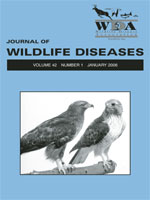Sylvatic plague is a flea-borne zoonotic disease caused by the bacterium Yersinia pestis, which can cause extensive mortality among prairie dogs (Cynomys) in western North America. It is unclear whether the plague organism persists locally among resistant host species or elsewhere following epizootics. From June to August 2002 and 2003 we collected blood and flea samples from small mammals at prairie dog colonies with a history of plague, at prairie dog colonies with no history of plague, and from off-colony sites where plague history was unknown. Blood was screened for antibody to Y. pestis by means of enzyme-linked immunosorbent assay or passive hemagglutination assay and fleas were screened for Y. pestis DNA by polymerase chain reaction. All material was negative for Y. pestis including 156 blood samples and 553 fleas from colonies with a known history of plague. This and other studies provide evidence that Y. pestis may not persist at prairie dog colonies following an epizootic.
How to translate text using browser tools
1 January 2006
No Evidence of Persistent Yersina pestis Infection at Prairie Dog Colonies in North-Central Montana
Brian E. Holmes,
Kerry R. Foresman,
Marc R. Matchett

Journal of Wildlife Diseases
Vol. 42 • No. 1
January 2006
Vol. 42 • No. 1
January 2006
Cynomys
fleas
prairie dogs
Sylvatic plague
Yersinia pestis




